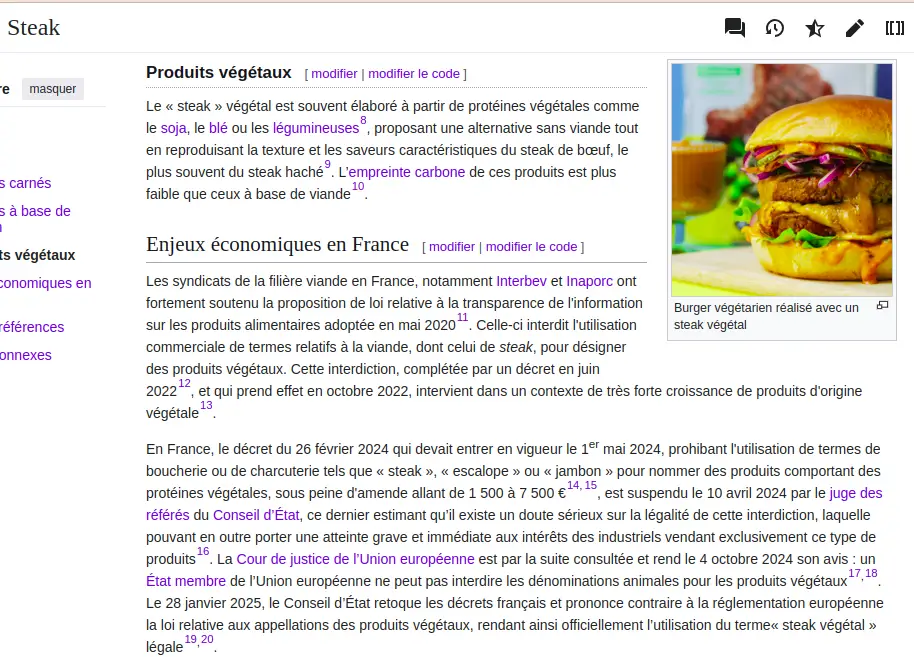Your brand image (how others perceive you) is built everywhere: in the press, on your social networks, through your website — and of course on Wikipedia. The online encyclopedia, consulted by millions of Internet users every day and systematically highlighted by Google, acts as a compendium of what’s being said elsewhere: press articles, scientific publications, and corporate communications.
At Wikiconsult, we help companies, institutions, and public figures better understand and manage the connection between global online reputation and visibility on Wikipedia, in a quest for consensus.
This article sheds light on:
- Wikipedia’s role in branding
- Interactions with the rest of your online presence (SEO, Google Knowledge Panel, Wikidata, PR, social networks)
Plan
Why Wikipedia plays a central role in branding
When someone types your name or your company’s name into Google, the Wikipedia page often appears at the very top — sometimes even before your official website. In other words, what Wikipedia says about you directly influences people’s first impression of your brand.
- If you have a page, it can reinforce your credibility.
- If you don’t, some may see this as a lack of legitimacy.
And when a page exists, its content also feeds the Google Knowledge Panel — logo, summary, key info — everything your customers or partners see first: at the top of Google results on smartphones, and the top right on desktop.
Wikipedia is also a key source for tools like ChatGPT. What the encyclopedia says about you can carry even more weight than your own site.
But beware: on Wikipedia, you can’t write whatever you want, nor can you tell your story freely. Information must come from independent, reliable sources — not from your own website or institutional materials. It’s a mirror of what’s said about you elsewhere. Working on your Wikipedia presence encourages you to think more broadly about your overall communication.
👀Check your eligibility on Wikipedia with a notability audit
Request a comprehensive audit from us to determine your eligibility on the encyclopedia (delivered within 48 hours) or learn about alternative options that may be more relevant for your situation.
How Wikipedia fits in with other online reputation levers
Wikipedia doesn’t exist in isolation — it’s directly connected to your other communication levers. What’s said about you elsewhere ends up being reflected on the encyclopedia, and vice versa.
SEO and visibility on Google and LLMs
- Wikipedia excerpts appear very high in search results.
- The way your brand is described directly affects the first impression people have of you when they search on Google.
Press Relations
- Press articles form the backbone of the sources used on Wikipedia.
- Simple press releases with no added value aren’t enough.
- Your PR strategy directly influences what can (or cannot) be written about you.
- In the event of a crisis, if negative articles exist, they must be mentioned. The only way to add nuance is to have other points of view reported by the media.
Wikidata, Wikipedia’s “digital twin”
- Wikidata is a database used by Google, AIs (such as ChatGPT), and many other applications.
- If Wikipedia speaks to humans, Wikidata speaks to machines.
- When a Wikipedia page exists, a Wikidata entry is usually created. Even without a Wikipedia article, Wikidata can still give you visibility.
- On Wikidata, you can enter key elements: logo, neutral description, different spellings or aliases for your brand…
- ⚠️ Wikidata entries are often deleted if you don’t follow the rules to the letter.
Concrete examples: when Wikipedia influences brand image
At Wikiconsult, we see every day how Wikipedia directly impacts brand perception. Here are three case studies.
Besins Healthcare: completing the company’s history for balance
Before our involvement: The English Wikipedia article on Besins Healthcare included only a short lead section and three long paragraphs under “Allegations of anticompetitive behavior.”
Our approach: We did not touch or comment on the “Allegations” section, leaving it to the community’s independent judgment.
Instead, we proposed — via the Talk page — new, well-sourced sections on the company’s origins, historical development, and operations, including references to verified historical works.
We sought consensus and third-party validation from volunteer editors before any changes were made.
Result: The updates were accepted and validated quickly by the community, improving the article’s structure and historical accuracy while maintaining full neutrality.
La Vie Foods: exposing a legal victory
La Vie Foods is a french brand of vegetarian charcuterie.
Background: following a legal ruling, it is now legal in France to use the terms “jambon”, “steak” or other charcuterie names to designate plant-based protein products. The challenge was to integrate this decision and its consequences into Wikipedia, since they were the subject of extensive media coverage.
What we do :
- Edit 7 Wikipedia pages on different types of charcuterie
- Add the legal decision, photos of charcuterie products of plant origin, and the use of charcuterie names to designate products of plant origin.
The result : greater visibility for the court ruling and plant-based variants of charcuterie.

Composer with an international career: expanding coverage beyond French Wikipedia
Observation: This composer already had a well-sourced page on the French Wikipedia, but not in English — even though their career and recognition are international.
Our approach: We created a new English-language Wikipedia article, based on reliable international sources, ensuring consistency between versions and maintaining a neutral, encyclopedic tone.
Result: The page now provides English-speaking readers and journalists with verified, accessible information, helping align the artist’s online presence with their real-world notability.
✍️Need help making edits on Wikipedia?
We can answer your questions for free via email, or you can hire our services for personalized support on the encyclopedia. Take advantage of our 12+ years of experience on Wikipedia!
Advantages of integrating Wikipedia into a global strategy
Too often, companies think about Wikipedia too late. They realize there aren’t enough media sources to create or enrich their page. As a result, the image that emerges online doesn’t reflect their real business.
That’s why it’s essential to integrate Wikipedia into your communications strategy early on. It’s one of the most consulted sources after your official website. The difference: on your own channels, you control the message; on Wikipedia, independent sources control it.
If there’s too big a gap between your channels (website, LinkedIn, Instagram…) and what Wikipedia says, it can create doubt among customers, partners, or investors. Conversely, a consistent presence inspires confidence.
Thinking about Wikipedia in advance also helps you anticipate crises. Studies show that corporate pages often emphasize negative aspects (see Le pouvoir discret de Wikipédia (french version), forthcoming November 2025). If critical press articles appear, they will inevitably be reflected on Wikipedia — you can’t remove them.
However, if other perspectives exist in the media, they can be incorporated, providing a more balanced view.
In short, integrating Wikipedia into your overall strategy allows you to:
- Gain visibility on Google and with AIs like ChatGPT
- Build trust with customers, partners, investors, and students
- Maintain consistency across your communication channels
- Anticipate and better manage crises
How to choose the right agency for your digital branding
Not all agencies are created equal when it comes to Wikipedia. Many excel in PR, social media, or SEO — but very few truly master the encyclopedia’s strict rules.
To get the right support, look for an agency or freelancer who:
- Knows Wikipedia, PR, and SEO — or works closely with specialists in these fields
- Understands how to select appropriate sources
- Respects the transparency rules required by Wikipedia
We often meet clients whose pages were deleted after being poorly written or sourced by a non-expert agency.
A good reflex: always ask for concrete examples. A service provider who works transparently will have no issue publicly showing examples of pages they’ve contributed to. If not, be cautious — this often means the work wasn’t done transparently, which is risky for you and contrary to the encyclopedia’s spirit.
At Wikiconsult, we operate precisely at the intersection of Wikipedia, public relations, and SEO. This holistic approach helps you develop a coherent, lasting brand image while respecting community rules.
This doesn’t mean it always works — or that your contributions will never be questioned. Since all edits occur in a context of potential conflicts of interest, it’s normal for Wikipedia volunteers to be vigilant. We must respect their decisions if they question relevance, and always seek consensus, acknowledging their voluntary time.

Written by Albin Guillaud
A Wikipedia contributor since 2014, with Wikiconsult I support businesses, institutions, public figures, and agencies looking to create, update, or monitor their presence on Wikipedia.